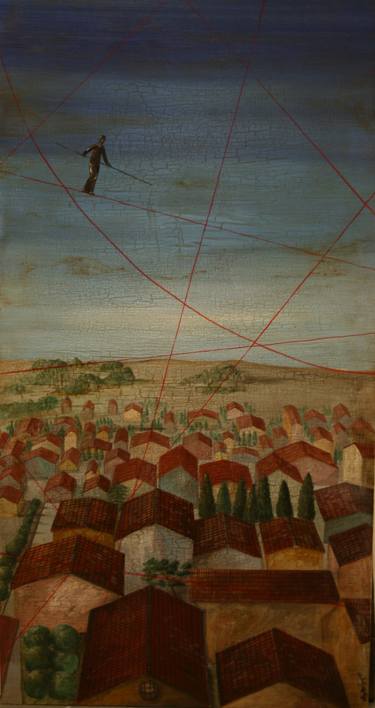The night you saw the moon and God
Life had just broken souls like breadsticks
So magnets went your eyes -
Every morning he gets in,
No clichés, no worn questions, it happens,
Full stop, breath your enemy,
But the tightrope walker
So gorgeous when holding his breath
Keeps breathing days, rips up your breath, your core,
Plays hard when it comes to life -
Have you ever met him?
Point is you skip shadows and holding trees,
Point is books kiss you off, see?
The child’s holding bread,
The mother holds a pomegranate, the symbol of soothing death -
Who knows, she might be friends with Hades and Kore -
Anyway, some think he’s all sunsets and stars,
Some he’s a bit hard to handle, a nuisance, an artist,
But he’s just that, my soul,
The unexpected lawn getting greener and closer
God so terribly close when death wore white -
Wasn’t it red or blue? -
Nope, she wore white, as ever the wind’s got that many hang-ups –
Of course we both know, stay put and do as we’re told.
[from "A Blue Soul," Argotist Ebooks]

The Tightrope Walker -- Margherita Cagnoni
Life had just broken souls like breadsticks
So magnets went your eyes -
Every morning he gets in,
No clichés, no worn questions, it happens,
Full stop, breath your enemy,
But the tightrope walker
So gorgeous when holding his breath
Keeps breathing days, rips up your breath, your core,
Plays hard when it comes to life -
Have you ever met him?
Point is you skip shadows and holding trees,
Point is books kiss you off, see?
The child’s holding bread,
The mother holds a pomegranate, the symbol of soothing death -
Who knows, she might be friends with Hades and Kore -
Anyway, some think he’s all sunsets and stars,
Some he’s a bit hard to handle, a nuisance, an artist,
But he’s just that, my soul,
The unexpected lawn getting greener and closer
God so terribly close when death wore white -
Wasn’t it red or blue? -
Nope, she wore white, as ever the wind’s got that many hang-ups –
Of course we both know, stay put and do as we’re told.
[from "A Blue Soul," Argotist Ebooks]

The Tightrope Walker -- Margherita Cagnoni
As in many mythologies, in which the underworld of the dead had the same name as the god of the underworld, Hades was that god. He was also called the god of wealth or “the rich one” because he possessed the precious metals of the earth, and also the god of the earth’s fertility; by the 5th century BCE, out of fear of pronouncing his real name, he became known as Plouton (from a root that meant "wealthy;" by this name he was known as Pluto to the Romans). His name derived from "the unseen one," although in "Cratylus" Platon had Sokrates argue that his name derived from "his knowledge of all noble things." He abducted Persephone (also known as Kore, "the maiden"), the daughter of his older sister Demeter and younger brother Zeus. (According to Hesiodos, the earliest source, during the wedding of Cadmus and Harmonia, Demeter lay in a freshlu plowed furrow and seduced Zeus' son or grandson Iasion. Zeus killed Iasion but Demeter persuaded him to make her lover immortal. Their son was Ploutos, the god of wealth whom the Romans confused with Plouton; Zeus blinded him so he would be able to dispense his gifts without prejudice; in other accounts Ploutos was the son of Persephone). Ares the war god, Hermes the god of trade, merchants, and athletes, and Apollo the god of music, truth, prophecy, healing, light, plague, and poetry, had all wooed Persephone but Demeter rejected them as suitors and hid her away from them. After Hades took her, Demeter in her despair prevented the growth of plants until she located her daughter. In her travels she visited Eleusis, where, to cheer her up, an old dry nurse exposed her genitals and delivered Demeter's son Iacchus. Finally, Zeus forced Hades to return Persephone to her mother, but Hades gave Persephone some pomegranate seeds to eat, thus forcing her to spend the winter with him every year. In some myths Persephone was the mother of Zeus' sons the wine god Dionysus, Iacchus the divine founder of the Eleusinian Mysteries which promised the initiated an enjoyable afterlife, and Zagreus, another god of the underworld who as an infant had been dismembered and eaten by the Titans, but his heart was spared; Athena rescued the heart and gave it to Zeus, who ground it up and gave it in a potion to Semele, who gave birth to the reborn Zagreus and was worshiped by the followers of Orphism.
ReplyDelete